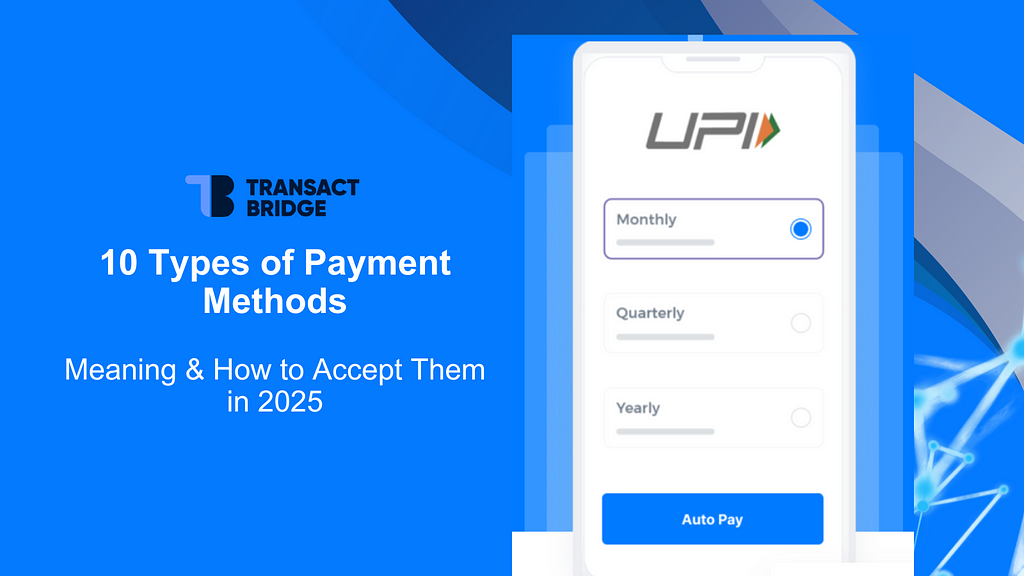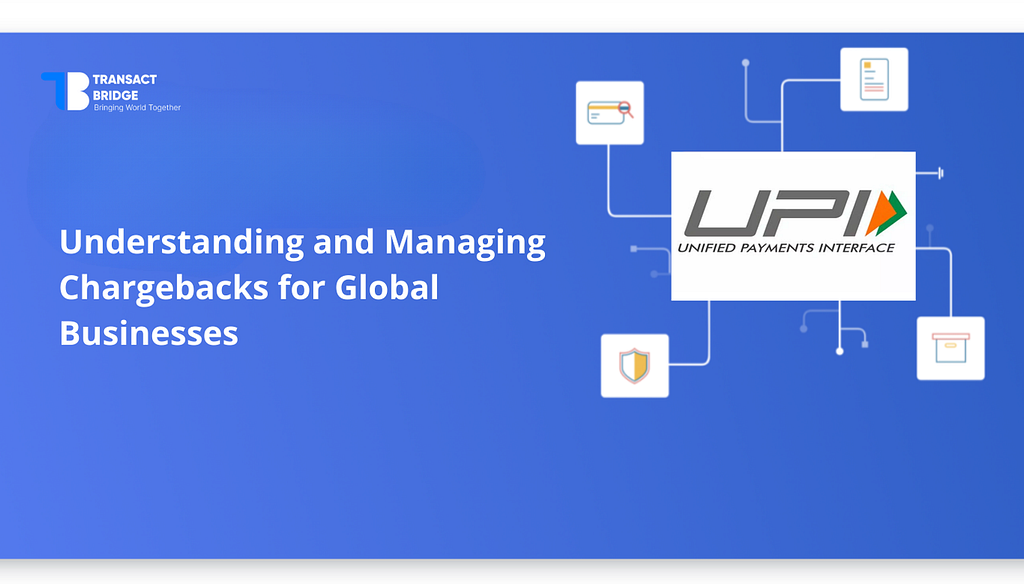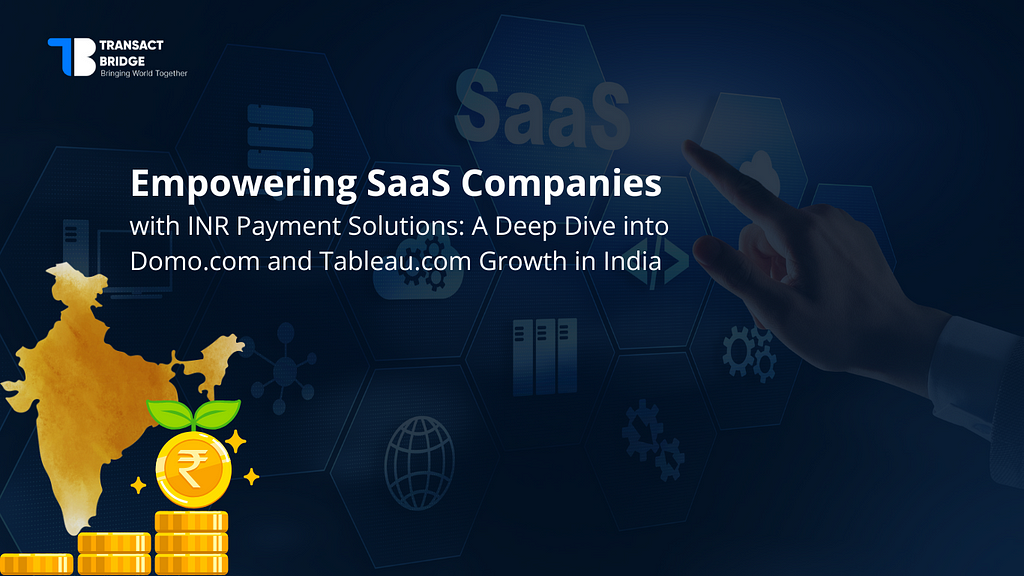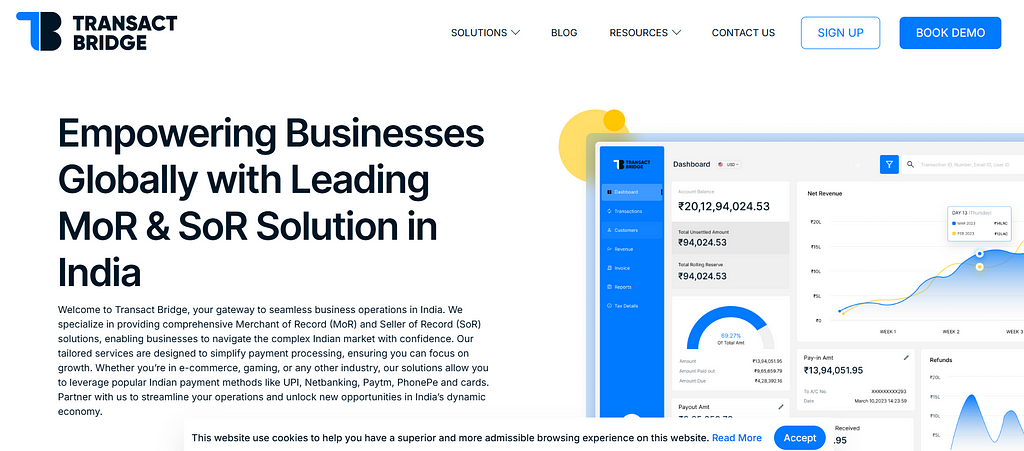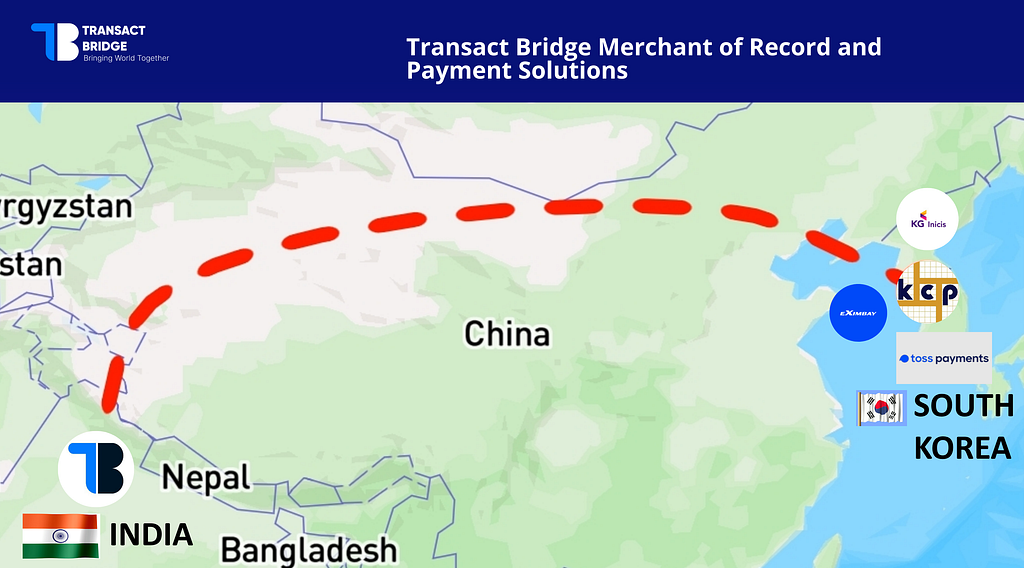
Best Compliance Support & Embedded Fintech Solutions for Online Business Start-ups
Published on: Wed 10-Sep-2025 02:46 PM

Why Compliance & Fintech Solutions Matter for Global Startups
Expanding a business globally is one of the most exciting yet challenging journeys for entrepreneurs. Whether you’re a SaaS founder in the UK, an e-commerce seller in the US, a live-streaming business in Europe, or a gaming item seller in Canada, entering new markets like India presents both opportunities and risks.
One of the biggest hurdles startups face is compliance—navigating tax laws, payment regulations, and financial frameworks while ensuring seamless customer experiences. This is where Merchant of Record (MoR) solutions, embedded lending, and advanced expense management tools come into play.
By leveraging the best compliance support for online business start-ups, businesses can focus on growth while leaving regulatory and financial complexities to trusted partners like Transact Bridge.
Understanding Compliance in Online Businesses
Regulatory Challenges for Cross-Border Businesses
When selling across borders, startups often deal with:
Taxation complexity (GST, VAT, withholding taxes).
KYC and AML checks for financial compliance.
Foreign exchange regulations when repatriating earnings.
Consumer protection laws in multiple jurisdictions.
For businesses entering India, compliance becomes even more crucial because the Indian market is regulated, fast-growing, and digitally savvy.
Why Compliance is Crucial When Selling to Indian Customers
India has over 900 million UPI users and a rapidly expanding e-commerce ecosystem. However, businesses must adhere to:
Goods and Services Tax (GST) on digital and physical goods.
Reserve Bank of India (RBI) guidelines for payment processing.
UPI-specific compliance rules.
Without proper compliance support, businesses risk penalties, blocked payments, and legal disputes.
Merchant of Record (MoR) Model Explained
The Merchant of Record model allows a third-party provider like Transact Bridge to handle:
Customer billing and invoicing.
Regulatory compliance (taxes, GST, UPI rules).
Currency conversion and remittance.
This makes cross-border transactions seamless while ensuring your business stays compliant and profitable.
Best Compliance Support for Online Business Start-ups
Common Compliance Risks for SaaS, E-commerce, and Digital Sellers
Tax filing errors leading to audits.
Non-compliance with data security laws (GDPR, Indian IT Act).
UPI and payment processing restrictions.
High FX costs without structured remittance support.
Key Compliance Solutions Every Startup Needs
MoR Partnership – A merchant of record like Transact Bridge takes over compliance obligations.
Automated Tax Calculation – Simplifies GST, VAT, and sales tax submissions.
Cross-border Payment Solutions – Ensures UPI collections in India and global remittances.
AML & KYC Monitoring – Prevents fraud and strengthens business trust.
Role of MoR in Tax, GST, and UPI Payment Regulations
By working with an MoR:
Businesses avoid penalties for incorrect GST filings.
UPI transactions are fully compliant with RBI rules.
Currency conversions are optimized, reducing financial leakage.
This enables startups to expand globally without worrying about compliance roadblocks.
Strategic Planning for Startups: Building a Roadmap for Success
Setting Realistic Goals for Expansion into India
For US, UK, and European startups, entering the Indian market is a game-changer. The opportunity is huge, but careful planning is vital. Founders must set goals such as:
Achieving seamless UPI collections.
Building trust with Indian customers through compliance.
Optimizing cross-border remittance with minimal cost.
Scaling without setting up a local entity (thanks to MoR solutions).
This entity-free model is especially powerful for SaaS founders, e-commerce sellers, gaming platforms, and streaming services, as it reduces overhead and speeds up market entry.
Legal and Financial Infrastructure Setup
Traditionally, companies needed an Indian subsidiary or entity to comply with GST and RBI rules. This required legal incorporation, local directors, bank accounts, and ongoing filings.
But with Merchant of Record (MoR):
No entity is required in India.
MoR becomes the official seller of record, handling tax and compliance.
Startups receive payments globally without local bureaucracy.
This saves time, cost, and complexity—while ensuring 100% compliance.
How MoR Streamlines Operations for Global Businesses
Taxation Simplified: MoR calculates and files GST automatically.
Payment Flexibility: UPI, wallets, cards, and net banking are integrated.
Remittance Support: Funds are converted and remitted abroad seamlessly.
Risk Management: Chargebacks, fraud, and compliance penalties are absorbed by the MoR.
This allows entrepreneurs to focus on growth, customers, and innovation, instead of wrestling with regulations.
Best Embedded Lending Solutions for Vertical SaaS
What is Embedded Lending in SaaS?
Embedded lending means integrating financial services directly into SaaS platforms. For example, a SaaS company serving e-commerce sellers could offer instant loans for inventory or ad spend, without redirecting customers to a bank.
Benefits for SaaS Founders and Small Businesses
Boosted Customer Retention: Businesses are more likely to stick with SaaS platforms that offer lending.
Revenue Growth: SaaS companies earn transaction-based revenue from lending.
Empowered SMEs: Small retailers and service providers get access to fast credit.
Case Studies of Embedded Lending Success
Shopify Capital has enabled thousands of merchants to access working capital.
Stripe Capital helps online sellers fund growth with revenue-based lending.
Platforms like Transact Bridge can integrate embedded lending into SaaS ecosystems, allowing vertical SaaS businesses to offer tailored financing to their users—a key competitive advantage.
Revenue-Based Repayments vs Fixed Weekly Payments for Small Retailers
Pros and Cons of Revenue-Based Financing
Revenue-based repayments mean that lenders take a percentage of sales until the loan is repaid.
Flexible during slow months.
Aligns repayment with business growth.
Total repayment may be higher if revenue grows quickly.
Pros and Cons of Fixed Weekly Payments
Fixed weekly payments involve repaying a set amount, regardless of revenue.
Predictable, easy-to-budget repayments.
Good for stable businesses with consistent sales.
Risky for seasonal or fluctuating businesses.
Which Repayment Model Works Best for Retailers Expanding Globally
Revenue-based financing works best for startups, e-commerce sellers, and SaaS platforms with variable revenue.
Fixed weekly payments suit stable offline retailers with predictable cash flow.
For cross-border sellers entering India, revenue-based financing is often the smarter choice, as it scales with unpredictable market growth.
Who Leads in Expense Management Within the Fintech Industry
Top Global Fintech Leaders in Expense Management
Brex (US) – Known for corporate cards and startup-focused financial tools.
Spendesk (Europe) – Helps SMEs automate expense tracking.
Payhawk (UK) – Offers global expense management for enterprises.
Innovations Transforming Expense Management for Startups
AI-powered expense categorization.
Real-time employee expense monitoring.
Integration with tax and accounting software.
How Transact Bridge Provides an Edge in Expense Handling
Unlike general fintech players, Transact Bridge specializes in helping global companies enter India compliantly. This includes:
Automated GST expense compliance.
Integrated expense and revenue management with MoR.
Cross-border cash flow optimization for SaaS, e-commerce, and digital sellers.
Why India is the Most Attractive Market for Global Sellers
UPI Dominance and Digital Payment Adoption
Over 11 billion UPI transactions monthly (NPCI, 2025).
Preferred by Indian consumers across age groups
Lower transaction fees compared to card payments.
Growing Demand for SaaS, E-commerce, and Digital Services
SaaS adoption among SMEs and enterprises is booming.
E-commerce sales in India projected to cross $200 billion by 2026.
Digital entertainment, gaming, and live-streaming are seeing explosive growth.
Compliance Challenges Foreign Sellers Must Overcome
GST filings without an entity.
UPI integration without local licenses.
Foreign exchange remittance restrictions.
With Transact Bridge MoR, all these barriers are eliminated—businesses can operate without setting up an Indian entity.
How Transact Bridge Supports Global Businesses with MoR
Simplifying Compliance for Startups
Handles taxation, invoicing, and reporting on your behalf.
Ensures data compliance (GDPR + Indian IT Act).
Provides legal protection as the official MoR.
Managing Taxes, Payments, and Currency Conversion
Collects payments via UPI, net banking, wallets, cards.
Handles GST compliance and returns.
Remits funds globally with optimized FX conversion.
One-Stop Fintech Solution for SaaS, E-commerce, and Digital Sellers
With Transact Bridge as your MoR partner:
No Indian entity is required.
Compliance is automated.
Payments and remittances are simplified.
Businesses scale faster without regulatory headaches.
Frequently Asked Questions (FAQs)
1. What is the best compliance support for online business start-ups?
The best compliance support comes from MoR solutions like Transact Bridge, which handle tax, payments, and regulatory filings so startups can focus on growth.
2. Do I need a local entity to sell in India?
No. With an MoR partner like Transact Bridge, you can sell in India without opening a local entity.
3. How do revenue-based repayments benefit small retailers?
They allow repayments to adjust with sales, reducing risk during slow months and supporting seasonal businesses.
4. What is embedded lending in SaaS?
Embedded lending integrates loans and credit directly into SaaS platforms, helping users access funding seamlessly without banks.
5. Who leads in expense management within the fintech industry?
Global leaders include Brex, Spendesk, and Payhawk, but Transact Bridge stands out for offering India-specific compliance and MoR-based expense management.
6. Why should startups consider India for expansion?
India has one of the fastest-growing digital economies, with UPI adoption, SaaS demand, and e-commerce growth, making it a top market for global sellers.
Conclusion: Building a Compliant & Scalable Future
Global startups face intense challenges when entering new markets—especially India, with its unique compliance, taxation, and payment ecosystem. But with best compliance support for online business start-ups, embedded lending, and expense management tools, success is within reach.
By partnering with Transact Bridge’s Merchant of Record solution, businesses can:
Expand into India without an entity.
Stay fully compliant with tax and payment laws.
Collect via UPI and remit globally with ease.
Scale faster with less risk and fewer overheads.
Whether you’re a SaaS founder, e-commerce seller, or digital entrepreneur, Transact Bridge helps you build a compliant, profitable, and scalable business in India.





